Newsletter for November, 2012
From Our Minister and President:
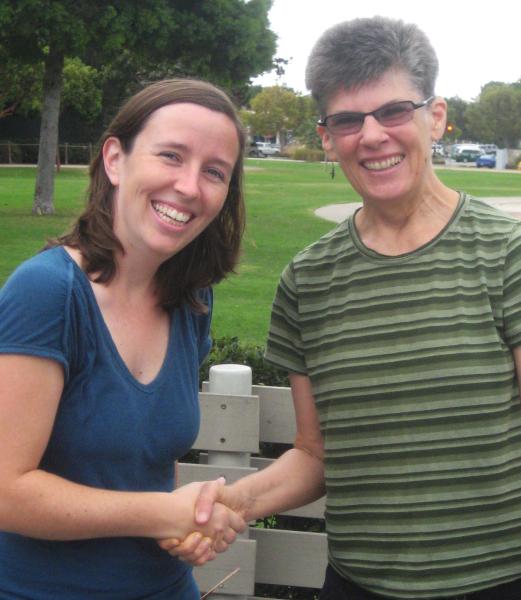 Unitarian Universalists are united not by belief but by covenant: the promises we make about how we treat one another and our world. The Rev. Erika Hewitt, as a parting gift to us, left us some observations about our congregation’s strengths and also areas where she saw room for growth. She strongly recommended that we initiate a month-long process to have a congregational conversation about good relationships and to establish a congregational covenant. When your board met in retreat last month, we committed to this process as our number one goal for the year.
Unitarian Universalists are united not by belief but by covenant: the promises we make about how we treat one another and our world. The Rev. Erika Hewitt, as a parting gift to us, left us some observations about our congregation’s strengths and also areas where she saw room for growth. She strongly recommended that we initiate a month-long process to have a congregational conversation about good relationships and to establish a congregational covenant. When your board met in retreat last month, we committed to this process as our number one goal for the year.
In the spirit of modeling good relationships, and of walking our talk, your minister and your board president decided to try out the covenanting process for ourselves. At our retreat we found the process energizing and deeply satisfying. Having just been through an exhaustive evaluation process, we are aware that we don’t always agree 100% on how to address issues of goal-setting, consensus-building, and decision-making facing the church. And we don’t immediately agree 100% on many topics, and we each find the need to explain and then reconsider our ideas; when we realize our goal of good communication, the ideas evolving from this process are better than the ideas we started with.
We are discovering that we work better together when:
We communicate frequently, and more often in person or by phone than via email. We support one another in courageous honesty, which calls us to share what we really think and feel.
We clarify our expectations for one another.
We honor confidentiality.
We work toward deep trust of one another, our staff, and our fellow leaders and community members.
We choose to publicly model respect and care as we navigate congregational conflict.
We avoid relationship triangles by encouraging one another to deal directly with the person with whom we
disagree.
We celebrate and enjoy our unique gifts as leaders and learners in this church.
We remain loyal to the bond of human connection that unites us, and to the guiding principles of our faith.
In future months you will hear more from your minister, your board, and other congregational leaders about the congregational covenanting process, when congregations as a whole affirm their commitment to navigating conflict with love and care. If we can do this, and do this together, we can do really big things for this community and the wider world.
In your corner,
Rev. Rebecca Benefiel Bijur, Minister
Cynthia Cottam, President
The UUCCSM 2012/13 Commitment Campaign
“You can give without loving, but you can’t love without giving.”
Please save the date: the 4th of November,
It’s a Sunday at church you’ll all want to remember.
All members and friends with your faith and your love
Will pledge just like last year — or even above!
Your new committee will all warmly greet you,
With encouragement, love, and of course we will feed you.
We’ll have lox and bagels, and cream cheese — how great.
It’s your generous love that we hope to create.
The Stewardship committee has gone over the edge
By collectively saying we'll increase our pledge.
How much YOU should give is all up to you,
Make it meaningful, generous, and do what you can do.
Be loving and giving to the church that we share
Both services — 4th of November,
We'll see you all there!
— Your Stewardship Committee,
Abby Arnold, Lucy Hahn, Natalie Kahn, Amy Lacombe
GRATITUDE
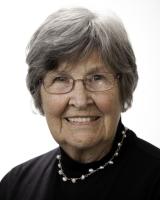 Bettye Barclay has provided this list of daily thoughts about our ministerial theme for November
Bettye Barclay has provided this list of daily thoughts about our ministerial theme for November
November 1 Let us be grateful to the people who make us happy; they are the charming gardeners who make our souls blossom. Marcel Proust
November 2 At times our own light goes out and is rekindled by a spark from another person. Each of us has cause to think with deep gratitude of those who have lighted the flame within us. Albert Schweitzer
November 3 The essence of all beautiful art, all great art, is gratitude. Friedrich Nietzsche
November 4 One looks back with appreciation to the brilliant teachers, but with gratitude to those who touched our human feelings. The curriculum is so much necessary raw material, but warmth is the vital element for the growing plant and for the soul of the child. Carl Jung
November 5 I would maintain that thanks are the highest form of thought, and that gratitude is happiness doubled by wonder. Gilbert K. Chesterton
November 6 Gratitude is the fairest blossom which springs from the soul. Henry Ward Beecher
November 7 Feeling gratitude and not expressing it is like wrapping a present and not giving it. William Arthur Ward
November 8 If future generations are to remember us more with gratitude than sorrow, we must achieve more than just the miracles of technology. We must also leave them a glimpse of the world as it was created, not just as it looked when we got through with it. Lyndon B. Johnson
November 9 Gratitude helps you to grow and expand; gratitude brings joy and laughter into your life and into the lives of all those around you. Eileen Caddy
November 10 Gratitude bestows reverence, allowing us to encounter everyday epiphanies, those transcendent
moments of awe that change forever how we experience life and the world. John Milton
November 11 No one who achieves success does so without acknowledging the help of others. The wise and confident acknowledge this help with gratitude. Alfred North Whitehead
November 12 Gratitude is the sign of noble souls. Aesop
November 13 One can never pay in gratitude: one can only pay ‘in kind’ somewhere else in life. Anne Morrow Lindbergh
November 14 We learned about gratitude and humility — that so many people had a hand in our success, from the teachers who inspired us to the janitors who kept our school clean . . . and we were taught to value everyone's contribution and treat everyone with respect. Michelle Obama
November 15 Gratitude is the most exquisite form of courtesy. Jacques Maritain
November 16 Gratitude is one of the least articulate of the emotions, especially when it is deep. Felix Frankfurter
November 17 All Americans owe a debt of gratitude to Dr. King for his bravery and commitment to civil rights and nonviolence that changed this nation — and world — for the better. Eliot Engel
November 18 Gratitude is when memory is stored in the heart and not in the mind. Lionel Hampton
November 19 Cultivate the habit of being grateful for every good thing that comes to you, and to give thanks
continuously. And because all things have contributed to your advancement, you should include all things in your gratitude. Ralph Waldo Emerson
November 20 Let gratitude be the pillow upon which you kneel to say your nightly prayer. And let faith be the bridge you build to overcome evil and welcome good. Maya Angelou
November 21 If the only prayer you said was thank you, that would be enough. Meister Eckhart
November 22 I made cranberry sauce, and when it was done put it into a dark blue bowl for the beautiful contrast. I was thinking, doing this, about the old ways of gratitude: Indians thanking the deer they'd slain, grace before supper, kneeling before bed. I was thinking that gratitude is too much absent in our lives now, and we need it back, even if it only takes the form of acknowledging the blue of a bowl against the red of cranberries. Elizabeth Berg
November 23 We must find time to stop and thank the people who make a difference in our lives. John F. Kennedy
November 24 Piglet noticed that even though he had a Very Small Heart, it could hold a rather large amount of
Gratitude. A.A. Milne
November 25 You pray in your distress and in your need; would that you might pray also in the fullness of your joy and in your days of abundance. Kahlil Gibran
November 26 Some people grumble that roses have thorns; I am grateful that thorns have roses. Alphonse Karr
November 27 We can only be said to be alive in those moments when our hearts are conscious of our treasures. Thornton Wilder
November 28 Do not tell the man that is carrying you that he stinks. African Proverb
November 29 I would love to believe that when I die I will live again, that some thinking, feeling, remembering part of me will continue. But much as I want to believe that, and despite the ancient and worldwide cultural traditions that assert an afterlife, I know of nothing to suggest that it is more than wishful thinking …The world is so exquisite with so much love and moral depth, that there is no reason to deceive ourselves with pretty stories for which there's little good evidence. Far better it seems to me, in our vulnerability, is to look death in the eye and to be grateful every day for the brief but magnificent opportunity that life provides. Carl Sagan
November 30 For each new morning with its light, For rest and shelter of the night, For health and food, for love and friends, For everything Thy goodness sends. Ralph Waldo Emerson
More Useful Additions to uusm.org
Project Dazzle is pleased to announce that our Membership Directory is now available online in the For Members area. Just log in to access a complete PDF of the most current directory, color photos and all, at any time.
We’ve added a Help link at the top of each page with answers to Frequently Asked Questions about website issues, such as how to create accounts. Please don’t hesitate to email us at webmaster@uusm.org if you have any questions. Not only will we answer you but this is how we learn what needs to be fixed or explained more clearly.
Orders of Service are also now archived online in the Sundays & Services area.
— Pam Teplitz and Liz Fuller for Project Dazzle
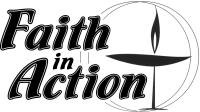 Carwasheros Join Us for “Salt of the Earth” Screening in Forbes Hall
Carwasheros Join Us for “Salt of the Earth” Screening in Forbes Hall
Six current or former carwash workers were among the 40 UUs and others who came to our church Saturday evening, September 29, to see the 1954 movie “Salt of the Earth,” sponsored by the Faith in Action (FIA) Commission. The movie is based on the true story of a prolonged strike by “Anglo” and Latino miners at Empire Zinc Company in Grant County, NM, and has many parallels to today’s struggle by carwash
workers to improve their lives through a union organizing campaign.
A goal of the Multiracial Development Committee (MRDC), an FIA component, is to make our congregation more racially and ethnically diverse. There are many ways we can reach out, personally and organizationally. Through our participation in the CLEAN Carwash Campaign and the campaign to maintain and expand living wages and good working conditions in Santa Monica hotels, MRDC and the Peace and Social Justice Committee (PSJ) are striving to make our church a beacon of social justice in our community and a gathering place for those involved in fighting against racism and class exploitation, and for immigrants’ rights.
Showing “Salt of the Earth,” with Spanish translation provided, fit right in.
Everybody enjoyed the movie, and a lively discussion followed it. One person said the most critical thing for working people to do “between now and November 6” is to reelect President Obama, and many agreed. Others felt that mass action such as that portrayed in the movie was more important than electoral politics, and some even questioned whether Obama actually was on the side of working people.
If you’d like to see “Salt of the Earth,” contact me and I’d be happy to lend you a DVD.
— Peggy Rhoads
Visit to Theo Lacy Detention Center
On September 20, Will Coley, Peggy Rhoads, and Nora Hamilton from UUCCSM participated in a visit to the Theo Lacy Detention Center in Orange County as part of an effort to evaluate the conditions and treatment of immigrants in facilities where undocumented immigrants are detained.
The Center was originally built in 1960 as a maximum- security prison; in 2010 it contracted with ICE (Immigration Control and Enforcement) to house 450 undocumented immigrants and is currently at full capacity. Our visit included an initial briefing by officers of the facility and of ICE; a partial tour of the facility, including the barracks where detainees are held, the nurses' station, “Special Management Units” (solitary confinement — a small windowless cell with a stone bed), and recreation facilities; interviews with some 133 detainees; and a final session with officers who addressed questions raised in the interviews. The officers were generally accommodating and responsive to our questions; it was clear they were making an effort to present Theo Lacy as a model detention center.
But there was a definite contradiction between this presentation and the observations and complaints of the detainees themselves.
The immigration detainees are for the most part guilty of minor infractions, or in some cases simply crossing the border without documents. They are housed separately from the general prison population in four barracks consisting of large cells with bunk beds crowded together. Each had a television set (although detainees complained that it was often broken) and a telephone (costing around 80 cents per minute with a $5 connection fee). Although the facilities may well have been superior to those of the general prison population, the general impression is one of control and confinement.
Among the grievances expressed by the detainees themselves were that the facilities were kept too cold, and that people were sick as a result; the food was monotonous (“baloney sandwiches every day”) and at worst inedible (“old and moldy carrots”); meal times were often rushed, in some cases three to five minutes; detainees lacked clean clothes; recreation hours had been shortened (reduced from two or three hours to one or less); and time was inadequate with visitors.
One detainee complained of inadequate care for his bipolar disorder, which he had coped with in the past
through a combination of medicine and counseling.
While Theo Lacy provided medicine, he did not receive counseling. When he had a panic attack, he was sent to solitary confinement, which increased his panic. Two of the most serious complaints had to do with access to legal assistance and treatment by guards. Several detainees reported being treated with disrespect and scorn by prison personnel, including racist jokes at their expense and, in at least one case, physical abuse. Although there is a grievance procedure, it is not clear that detainees feel they can take advantage of it, perhaps due to fear of retaliation if they complain.
In the final session following the interviews, the officers appeared to take these accusations seriously and
agreed that the deputies needed sensitivity training.
With respect to legal access, the facility has a law library with computers through which detainees allegedly have access to legal information and a list of pro bono lawyers in the area. However, only a minority appear to have a lawyer, and while some are awaiting immigration hearings (which can be postponed for months at a time), many are in a type of limbo, lacking legal representation and even advice (“I don’t know what I’m doing here”). One issue may be a lack of knowledge and skills to take advantage of the information available. Several — perhaps a majority — are Spanish-speaking, some of them speaking little to no English.
If Theo Lacy is indeed a “model facility,” it indicates that the practice of confining individuals who have committed minor infractions or simply crossed the border without documents is both wasteful and inhumane.
While efforts should be made to improve the conditions of detainees, it is also necessary to challenge current immigration policy and to provide alternatives to confinement for undocumented immigrants.
Legislative Initiatives
Unfortunately, an opportunity to address this issue was lost as a result of Governor Brown’s veto of the Trust Act, which would have limited the enforcement of ICE requests to temporarily detain undocumented immigrants who are arrested so that ICE could determine what to do with them. The Trust Act, which was promoted by the UU Legislative Ministry of California (UULMCA), would have permitted detention only in cases in which the immigrant has been accused of serious or violent crimes. As stated by Rev. Lindi Ramsden, Executive Director of the UULMCA, “His veto puts many hard-working immigrant families at continued risk of being split by deportations, and continues to erode the trust between the immigrant community and law enforcement, compromising our community safety.”
Although Brown vetoed the Trust Act (promising to revisit it in the future), he did sign a bill promoted by Rep. Gil Cedillo (AB 2189), that would enable young undocumented immigrants in California who qualify for a two-year stay of deportation and work permits through Deferred Action for Childhood Arrivals to obtain drivers’ licenses in California.
Governor Brown also signed AB685, the Human Right to Water Act, which was also promoted by UULMCA. It is estimated that some 11 million people, for most part in poor and minority communities, lack access to safe drinking water. AB685 establishes as state policy that everyone in California has “the right to safe, clean, affordable and accessible water sufficient for basic needs.”
— Nora Hamilton
FIA Trip to the Great Wall
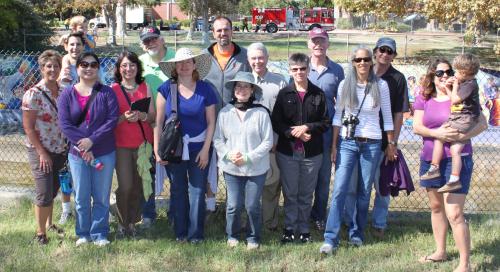
Twenty UUs saw a graphic history of Los Angeles, from 20,000 years ago through the early 1960s, as they participated in the 3rd annual Dining for Dollars trip to the Great Wall of Los Angeles, sponsored by the Multiracial Development Committee. Vilma Ortiz served as docent, providing commentary as we walked along the east side of the Tujunga Flood Control Channel, viewing the half-mile long mural (by far the world's longest) painted on the west side. The bright, intense colors of the mural, which was restored recently, seemed to leap off the wall. The Great Wall illustrates the struggles of workers in the 1930s against the ravages of the Great Depression and the struggles against discrimination and racism of Native Americans and of immigrants from Mexico, Central America, China, and Japan, and of African Americans, as well as fights for equality by women and gays and lesbians, all this alongside and intertwined with the technological changes — such as electricity, railroads, the film industry, and tract houses — that have shaped life in LA. The morning walk was followed by lunch at Pitfire Pizza in nearby North Hollywood.
A Way to Expand Our Service
We’ve been having some good conversations lately about how we members and friends of UUCCSM might better serve the community around us, and whether the Jericho Road Project might be a way for us to do that. Now let’s meet up and discuss the next step.
On Sunday, November 18, at 12:30 p.m., we’ll get together in the Cottage and decide whether or not UUCCSM should conduct a Jericho Road feasibility study (the next step in the process of becoming part of the Jericho Road Project).
But first, what is the Jericho Road Project? It’s an organization that bridges communities by matching the professional talents of volunteers (that's us) with the needs of community-based nonprofit organizations (that’s the folks all around us) to promote community development, strengthen social services, and enrich the lives of volunteers (that's us again). You can read all about it in a recent UU World article: http://tinyurl.com/UUJerichoRoad
Once you’ve read about Jericho Road, we hope you’ll join us as we decide whether or not to take the next step. All are invited to attend on November 18 at 12:30, and a light lunch will be served. For more information,
contact Patrick Meighan.
Want to Untangle the Ballot Propositions?
Anyone interested in reading the recommendations of the UU Legislative Ministry on the California ballot
propositions for the November 6 election can find information at www.uulmcaaction.org.
Thank you to Jennifer Westbay for stepping in for a few months as “Splinters from the Board” correspondent. Charles Haskell has suggested that I write the column this month and see how it goes. So, let me know how it went, please!
A part of October’s board meeting was to complete a ministerial evaluation for the UUA.This confidential process conducted by the board and the Committee on Ministry is a step toward the UUA approving Rebecca for Final Fellowship.
The president reported that the Town Hall went very well. Although there is a strong preference for an historical roof, we will be going forward with a combination tile and asphalt roof due to the expensive ramifications of an all-tile roof.
After much struggle, we now have a Stewardship Committee, chaired by Abby Arnold. Thank you, Abby! We are also very grateful to additional committee members Natalie Kahn, Amy Lacombe, and recently returned church member Lucy Hahn. The board has been asked to actively support the Stewardship Committee by making calls and helping at their special events.
The board decided to accept the directed donations graciously given by Patrick Meighan for the Stewardship Committee ($5,000) and by Gaye Deal for the music program ($5,000). The board recommends that directed donations be addressed case by case.
The music program has been energized by our new Music Director, DeReau Farrar. Board members shared very positive responses to his work so far. DeReau has been given the blessing to move forward and run the program as he outlined in a letter to the board this month. Don’t be surprised if you start to hear section leaders again and music from more of the talent within our community.
— Bronwen Jones
From Our DRE:
 What is there for me to say about this month’s congregational ministry theme — Gratitude — that isn’t so well-worn that it sounds merely trite rather than meaningful? As Thanksgiving approaches, we are reminded to give thanks: to our families, to our friends, to people who’ve done important things in the world, to all those who make our lives easier or bring meaning to it — and so forth. But is there something more that we can do this month that might allow us to approach the act of giving thanks as a spiritual practice?
What is there for me to say about this month’s congregational ministry theme — Gratitude — that isn’t so well-worn that it sounds merely trite rather than meaningful? As Thanksgiving approaches, we are reminded to give thanks: to our families, to our friends, to people who’ve done important things in the world, to all those who make our lives easier or bring meaning to it — and so forth. But is there something more that we can do this month that might allow us to approach the act of giving thanks as a spiritual practice?
I read an article recently that posited a difference in attitude toward luck between people who are optimists and those who are pessimists. To draw an example from my own life, a pessimist would feel very unlucky for having slipped on the stairs and broken her ankle. An optimist in the same situation, however, might relate her great fortune for having experienced only a simple ankle break — she was so lucky to have gotten off with a minor injury, when a slip such as that could have resulted in a broken neck.
In “The Secret of Saying Thanks,” children’s book author Douglas Wood suggests that people don’t give thanks because they are happy, but that they are happy because they give thanks. The act of giving thanks for the good things in our lives is in essence choosing the optimist’s outlook. Even in times of struggle and hardship, there are things in our lives that we are so very lucky to have experienced, if we can only manage to recognize them.
This month I invite you to join me in a practice of gratitude. Take a few moments each evening, perhaps over dinner with your family or when you’ve just gone to bed, to call to your attention something that you experienced that day that might have escaped your notice without this moment of reflection: what one small thing happened today that you are glad about? If you tend toward the pessimist’s outlook, what happened to you today that an optimist looking over your shoulder might identify as lucky?
Tonight, as I think about my time with all of you, I am deeply grateful for this congregation’s willingness to change and grow and experiment with new ideas and new programs. I have served as your DRE for nine years now, and the work feels just as fresh and exciting as it did at the beginning. What a gift that is! Thank you for walking with me on this journey. It’ll never get old.
— Catherine Farmer Loya
This month in the children’s RE program
December 16 - Group rehearsal for all at RE
ADULT DOINGS
Announcing the 2012–13 UUA Common Read
 “The New Jim Crow: Mass Incarceration in the Age of Colorblindness” by Michelle Alexander is the 2012–13 UUA Common Read. Alexander, an attorney and civil rights advocate, asserts that crime-fighting policies and systems in the U.S., such as the "war on drugs" and the incarceration system, disproportionately and intentionally affect Americans of color. At the 2012 General Assembly in Phoenix, Alexander facilitated a well-attended workshop on this subject, that received rave reviews from attendees.
“The New Jim Crow: Mass Incarceration in the Age of Colorblindness” by Michelle Alexander is the 2012–13 UUA Common Read. Alexander, an attorney and civil rights advocate, asserts that crime-fighting policies and systems in the U.S., such as the "war on drugs" and the incarceration system, disproportionately and intentionally affect Americans of color. At the 2012 General Assembly in Phoenix, Alexander facilitated a well-attended workshop on this subject, that received rave reviews from attendees.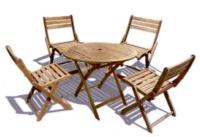 Patio Chat
Patio Chat Writers’ Group Continues
Following a very successful three-week introduction facilitated by Bettye Barclay, the group has decided to continue on a permanent basis on the 2nd and 4th Wednesday evenings of each month. Writers will meet in the comfortable seating area in Forbes Hall at 7 p.m. beginning on November 14.
Neighboring Faiths for Adults?
For years your Adult Programs Committee has been besieged by requests to provide for adults what we routinely offer to our children — the opportunity to visit other faith communities to learn about their beliefs and practices. Beginning after the winter holidays we will offer periodic visits to area houses of worship including a guided tour of their facility and a short talk by one of their members as well as attendance at a service or event. We are hoping to visit the local Sikh community early in 2013. Keep your eye on the newsletter and the Lifespan Table for breaking news and registration opportunities.
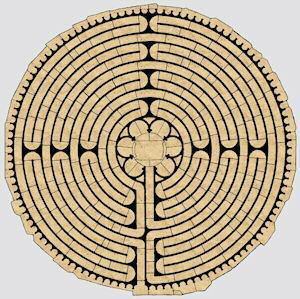 Historical Roots and Contemporary Uses of the Labyrinth
Historical Roots and Contemporary Uses of the LabyrinthSunday, November 4, 12:30 p.m., with Annemarie Rawlinson
The Small-Group Ministry program will begin anew in 2013. Members of a Small-Group Ministry group get to know one another and deepen their own spirituality by participating together in discussions of topics of universal human significance.
The spirit of community that develops in a group radiates outward, increasing the members’ connection to UUCCSM and to the world at large.
Of course, there is nothing new about church folks meeting together in small groups and having discussions. However, the groups of a Small-Group Ministry program have a unique set of features that make them different from study groups, classes, committees, task forces, support groups, affinity groups, or any of the other groups that one typically finds in a church:
The groups are people-centered rather than task-centered. You may get to know people by serving on a committee with them, but that's not why committees exist. Committee meetings are designed to get something done, not to foster connections between people.
The groups are on-going rather than running for a set term. Not everyone who joins a group will stay with it for years and years, but the possibility is there if you want it.
The groups are not isolated, but are part of a program that is integrated with the larger life of the church. They are an important ministry of the church.
The groups give back to the church and the wider community by annually performing some kind of service as a group project, to be determined by the group.
There's more to come. You'll be hearing a lot about Small-Group Ministry in the coming months. Registration begins January 13, 2013.
Also Coming Soon
• An all-day spiritual retreat with Rev. Rebecca
• A new slant on UU history with Catherine Farmer Loya
• Building Your Own Theology: Ethics with Leon Henderson-MacLennan
• Workshops on the environment
• A documentary film festival
The Lifespan Table in Forbes Hall is the place to go for information on all of these and many more activities. It is always staffed on Sunday mornings after each service by at least one member of the Lifespan Religious Exploration Committee.
